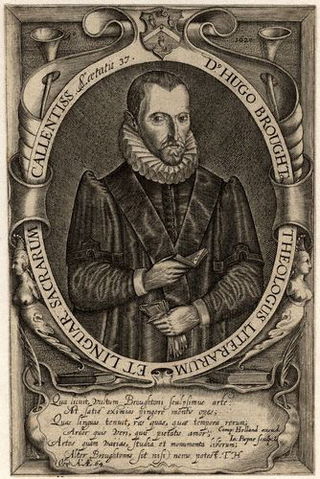Related Research Articles

The King James Version (KJV), also the King James Bible (KJB) and the Authorized Version (AV), is an Early Modern English translation of the Christian Bible for the Church of England, which was commissioned in 1604 and published in 1611, by sponsorship of King James VI and I. The 80 books of the King James Version include 39 books of the Old Testament, 14 books of Apocrypha, and the 27 books of the New Testament.

Hugh Broughton was an English scholar and theologian.

John Overall (1559–1619) was the 38th bishop of the see of Norwich from 1618 until his death one year later. He had previously served as Bishop of Coventry and Lichfield, as Dean of St Paul's Cathedral from 1601, as Master of Catharine Hall from 1598, and as Regius Professor of Divinity at Cambridge University from 1596. He also served on the Court of High Commission and as a Translator of the King James Version of the Bible.
Hadrian à Saravia, sometimes called Hadrian Saravia, Adrien Saravia, or Adrianus Saravia was a Protestant theologian and pastor from the Low Countries who became an Anglican prebend and a member of the First Westminster Company charged by James I of England to produce the King James Version of the Bible.
Richard Clarke or Clerke was an eminent scholar, translator and preacher in the Anglican Church.
John Layfield was an English scholar and Bible translator.
Robert Tighe was an English cleric and linguist.
Richard Thomson, sometimes spelled Thompson, was a Dutch-born English theologian and translator. He was Fellow of Clare Hall, Cambridge and the translator of Martial's epigrams and among the "First Westminster Company" charged by James I of England with the translation of the first 12 books of the King James Version of the Bible. He was also known for his intemperance and his doctrinal belief in Arminianism.
William Bedwell was an English priest and scholar, specializing in Arabic and other "oriental" languages as well as in mathematics.
Francis Burleigh, sometimes spelled Burghley, was born in London around 1552. He studied at St. Catherine's College, Cambridge, then Queens' College, Cambridge, and finally Pembroke College, Cambridge. "He graduated B.A. in 1583, proceeded M.A. in 1587 and B.D. in 1594. He eventually became doctor of divinity in 1607 shortly after he had commenced his work on the translation".
William Barlow was an Anglican priest and courtier during the reign of James I of England. He served as Bishop of Rochester in 1605 and Bishop of Lincoln in the Church of England from 1608 until his death. He had also served the church as Rector of St Dunstan's, Stepney in Middlesex and of Orpington, in Kent. He was also Dean of Chester Cathedral, and secured prebends in Chiswick and Westminster.

John Richardson was a Biblical scholar and a Master of Trinity College, Cambridge from 1615 until his death.
Roger Andrewes was an English churchman and academic, archdeacon and Chancellor at Chichester Cathedral in the English Church. He was also a scholar, a Fellow of Pembroke Hall and was, in 1618, made Master of Jesus College, Cambridge.
Thomas Harrison was an English Puritan scholar, a Vice-Master of Trinity College, Cambridge, and one of the translators for the King James Version of the Bible.
Robert Spaulding was an English scholar, Fellow of St John's College, Cambridge and one of the translators, in the "First Cambridge Company", of the King James Version of the Bible. The company translated from 1 Chronicles to the Song of Solomon. He succeeded Edward Lively as Regius Professor of Hebrew at Cambridge.
Andrew Bing (1574–1652) was an English scholar. He was a fellow of Peterhouse, Cambridge, and succeeded Geoffrey King as Regius Professor of Hebrew at Cambridge. He served on the "First Cambridge Company" charged by James I of England with translating parts of the Old Testament for the King James Version of the Bible.
Francis Dillingham was an English Protestant scholar, cleric and Bible translator.
Richard Kilby (Kilbye) (1560–1620) was an English scholar and priest.
Geoffrey King was an English Protestant theologian, a Fellow and Regius Professor of Hebrew at King's College, Cambridge. He was among the First Westminster Company charged by James I of England with the translation of the first 12 books of the King James Version of the Bible.

Literature in early modern Scotland is literature written in Scotland or by Scottish writers between the Renaissance in the early sixteenth century and the beginnings of the Enlightenment and Industrial Revolution in mid-eighteenth century. By the beginning of this era Gaelic had been in geographical decline for three centuries and had begun to be a second class language, confined to the Highlands and Islands, but the tradition of Classic Gaelic Poetry survived. Middle Scots became the language of both the nobility and the majority population. The establishment of a printing press in 1507 made it easier to disseminate Scottish literature and was probably aimed at bolstering Scottish national identity.
References
- ↑ "Liveley, Edward (LVLY564E)". A Cambridge Alumni Database. University of Cambridge.
- McClure, Alexander. (1858) The Translators Revived: A Biographical Memoir of the Authors of the English Version of the Holy Bible. Mobile, Alabama: R. E. Publications (republished by the Maranatha Bible Society, 1984 ASIN B0006YJPI8 )
- Nicolson, Adam. (2003) God's Secretaries: The Making of the King James Bible. New York: HarperCollins ISBN 0-06-095975-4
